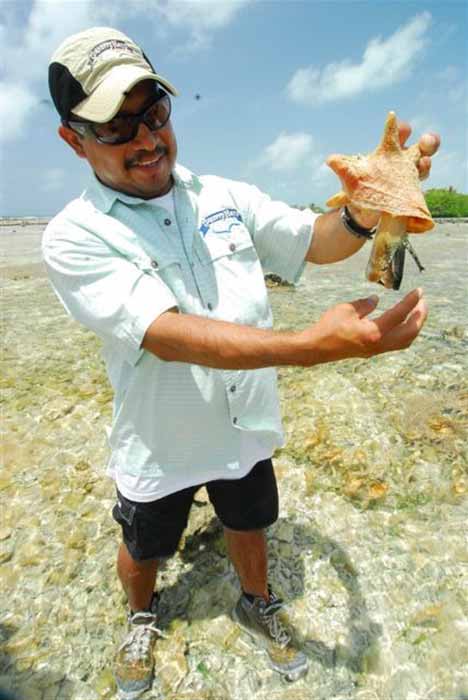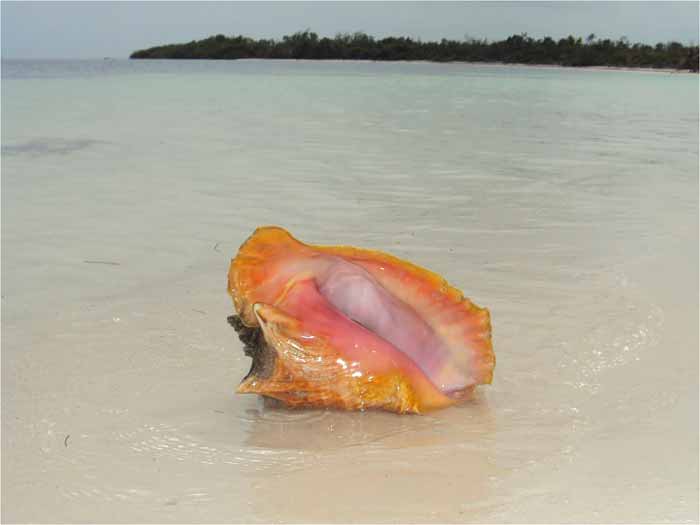Strong ties between fly fishers lead to MSU, Belize collaboration

The conch industry in Belize supports about 2,800 fishermen. One of them is shown here placing a conch in his boat. (Photo courtesy of Alex Anderson). |
BOZEMAN - Strong connections between fly fishers in southwest Montana and Central America have led to new research at Montana State University.
The project is focused on conch, a sea snail that's known for its delectable meat and large shell. The research is spearheaded by one of the managers of Turneffe Flats Resort who is working on his master's degree in fish and wildlife management at MSU and could someday - if his fans are right - become prime minister of his country, Belize.
Alex Anderson, 27, not only served two years as student body president at the University of Belize, but he helped drive two major projects that promote conservation in this country along the Caribbean Sea. One created Belize's largest marine reserve. The other led to the protection of bonefish, permit and tarpon as catch-and-release species in Belize. Anderson comes from a family of fly fishing guides and worked seven years at the internationally known Turneffe Flats Resort. Although he grew up in Cotton Tree, a town of 600 people and three streets, he is known all over Belize.

Abel Coe holds up a conch shell and the snail that lives inside it. (Photo courtesy of Alex Anderson). |
"There are a little over 300,000 people in the country, and 200,000 know Alex," said his faculty adviser, Al Zale, leader of the Montana Cooperative Fishery Research Unit in MSU's Department of Ecology.
Anderson also has a heart for Belize, and it's currently beating for people who are trying to make a living selling conch.

Conch fishermen usually spend eight to 10 days together on a sailboat. From there, they launch a small boat, a pod, that they fill up with conch. (Photo courtesy of Alex Anderson). |
The conch industry in Belize supports about 2,800 fishermen and 10,000 others, but it's threatened by over-fishing, Anderson said. From 2004 to 2009, the conch harvest from Turneffe Atoll declined by more than half.
Although he knows all about the bonefish, permit and tarpon that draw fly fishers to the Turneffe Atoll, Anderson said he decided to focus his research on conch after he and his MSU advisers consulted with experts in the Belize Fisheries Department and the University of Belize's Environmental Research Institute. His goal is to provide reliable information that Belizeans can use to ensure that the conch industry is sustainable far into the future.
"We are not interested in shutting people down, but in preserving the fisheries so that they can continue to fish," said Bob Bramblett, an MSU research professor who is part of Anderson's team and has traveled to Belize many times.
"It's a true collaboration," he added.
Anderson will start his fieldwork this summer. He and two local fishermen will first string ropes along transects for surveys across the Turneffe Atoll, shallow water off the coast of Belize. Then, they will dive, snorkel and wade along those transects to count and measure conch and record their locations. Afterward, Anderson will analyze his findings, develop models for viable conch populations and share his results.
The fact that someone from Belize came to Montana to conduct conch research is not as unusual as it might sound, according to Anderson and his mentors.

A conch is a sea snail known for its delectable meat and large shell. (Photo courtesy of Alex Anderson). |
"There's a major connection between Bozeman and Belize, and it has to do with the fish," Zale said.
Anderson came to MSU because his boss, the owner and operator of Turneffe Flats resort, saw Anderson's potential and wanted to help him succeed, Zale said. Craig Hayes grew up in South Dakota and lived in the Black Hills around 30 years below relocating to Bozeman. Although he now lives in Belize most of the time, he also fishes in southwest Montana and is board chairman for the Bozeman-based Turneffe Atoll Trust. Because of his persistence in protecting Turneffe Atoll, the "largest and most biologically diverse coral atoll in the Western Hemisphere," Hayes was named the 2013 "Angler of the Year" by Fly Rod and Reel magazine.
"Craig Hayes realized that Alex will be good for the country's future. He was also concerned for Alex's future," Zale said. "It turns out that because Belize is a fly fishing destination, many of the same people are also fishing up here."
Hayes wrote by email that, "Several of Alex's family members have worked for us, and he started out with a lower level job and worked his way up the ladder doing well at everything he tried. Alex has a great empathy for people, and his ability to get along well with almost anyone is, I think, one of his greatest strengths."
While investigating opportunities for Anderson, Hayes learned more about the fisheries research and education available at MSU. He met with Zale and Bramblett, then encouraged Anderson to enroll at the university nicknamed "Trout U."
"A natural connection developed when we moved our U.S. home base to Bozeman and then I met Al Zale and Bob Bramblett who appeared to be great people and also very knowledgeable in their field," Hayes said. "Our instincts were correct, and I think it's been a great fit for Alex."
Anderson came to MSU last August. Although Montana's winter went on far too long and he bought vitamin D and a humidifier to survive, he said he's glad he came. He has gained knowledge and different perspectives that will benefit his country. In the process, he has seen how Montanans, like Belizeans, appreciate the outdoors. He has tried ice fishing and made friends.
Zale and Bramblett said the new connections with Belize could lead to other collaborations, as well. They also hope that they will lead to new study abroad opportunities for MSU undergraduate students.
Montana State News Service

